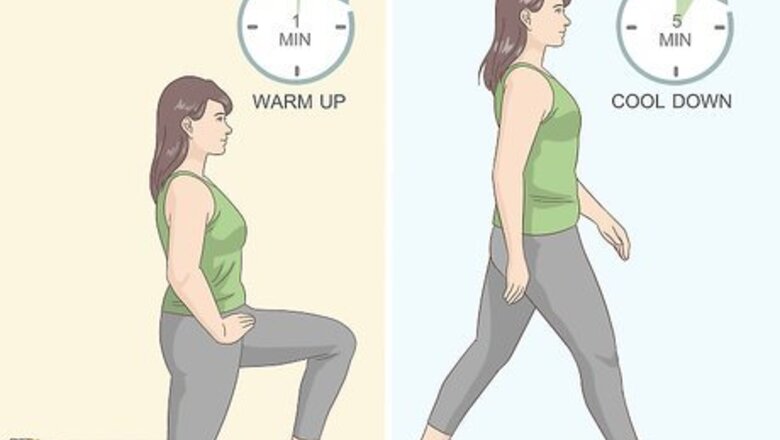
views
X
Trustworthy Source
HelpGuide
Nonprofit organization dedicated to providing free, evidence-based mental health and wellness resources.
Go to source
- Reduce fat overall by following a dynamic exercise routine with cardio, strength training, and HIIT.
- Minimize the appearance of any side fat with oblique exercises like planks, side planks, plank dips, and mountain climbers.
- Keep your body in top shape by eating plenty of complex carbs, fruits, veggies, and healthy fats. Drink lots of water, too!
Setting up an Exercise Routine
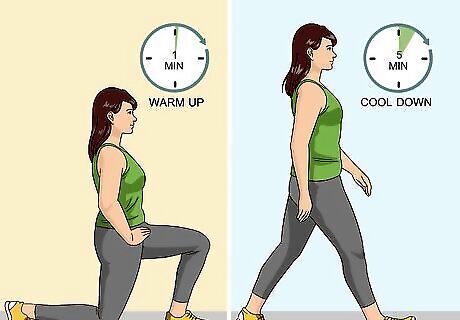
Warm up before exercising and cool down afterwards. It's important to always warm up your muscles before exercising. To warm up, go for a brisk, 5-10 minute walk, do some jumping jacks for 1 minute, or do lunges for 1 minute. In general, try to get your heart rate up and warm up the muscles you'll be using. To cool down, try another 5-10 minute walk, or continue your cardio exercise at a lower level of intensity. Stretch after you've warmed up and before you start exercising, or after you've exercised and before you cool down.
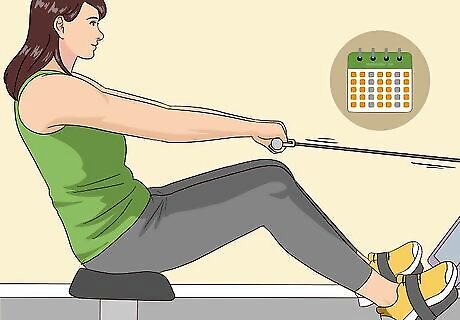
Do cardio 5 times a week. Aim for at least 30 minutes of cardio per session, or 1 hour for fast weight loss. Cardio workouts include boot camp, running, cycling, swimming, rowing, flow yoga, and using an elliptical.
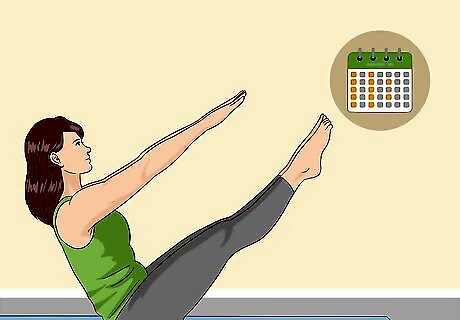
Do strength training 2-3 times a week. Aim to do strength training for around 30 minutes per session. Strength training can include pilates, barre classes, weight lifting, or bodyweight exercises. Muscles burn fat more efficiently. Doing strengthening exercises also boosts your metabolism.
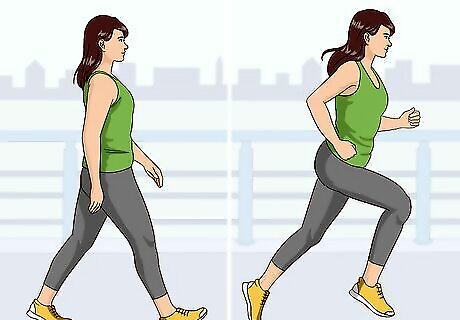
Incorporate high-intensity interval training (HIIT) into your cardio. Mix periods of medium intensity with periods of 1 to 4 minutes of high intensity for half an hour. This burns the most all over body fat. Make sure to recover after HIIT exercises with water and healthy snacks. If you reward yourself for exercising with unhealthy foods, you won't see consistent results.
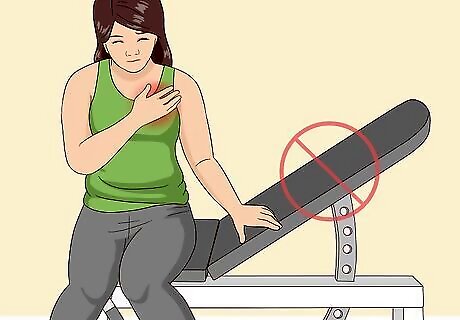
Stop any exercise immediately if you feel chest pain. Likewise, take a break if you have joint pain, lightheadedness, or have trouble breathing. Don't try to push yourself through these kinds of pain. Seek medical care, especially for chest pain and trouble breathing.
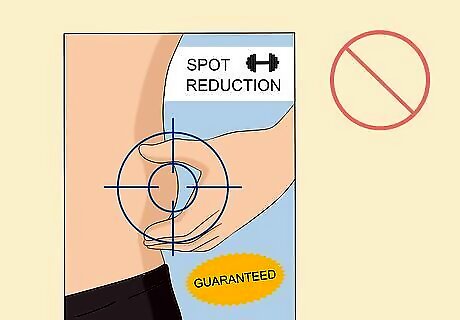
Ignore fitness trainers or programs that claim to target a single area of the body. Although it can be tempting to look for exercises to lose weight in one “problem” area, scientific studies suggest that this isn’t possible. Also, many exercises that supposedly target one part of the body don’t burn enough calories for weight loss, meaning you won’t see many changes at all. The only way to lose weight in a specific area is to lose weight overall. Building muscle in your core won’t help you lose side fat, but it will tone the area and reduce the appearance of fat.
Strengthening Your Oblique Muscles
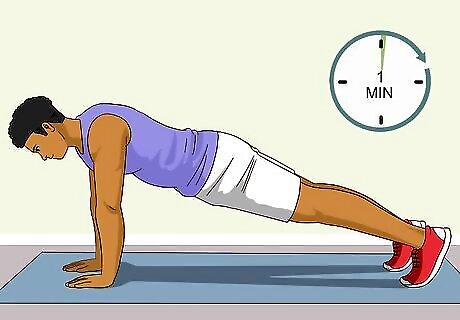
Hold a plank for about 1 minute. To get into the classic plank position, start on all fours on the ground with your knees shoulder-width apart. Lift your knees off of the ground and extend your body into a straight line. Keep your wrists under your shoulders and your neck relaxed with your core muscles tight. Try a high plank position with your hands on the ground, or a low plank position with your elbows on the ground. Both are effective. If you can’t hold a plank for a whole minute, hold it for as long as you can and gradually work towards holding it longer. You can also try doing a plank on your knees to reduce the amount of weight you’re holding. For more of a challenge, try holding a plank for up to 3 minutes.
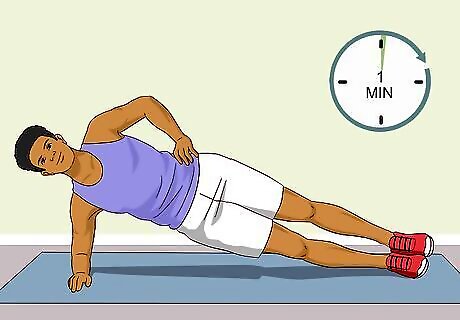
Move onto your side and hold a side plank for 1 minute. From the low plank position, put all of your weight onto one arm and turn your body until you are resting on one arm and one foot. Keep your body in a long, straight line and your core tight. Repeat this exercise on the other side.
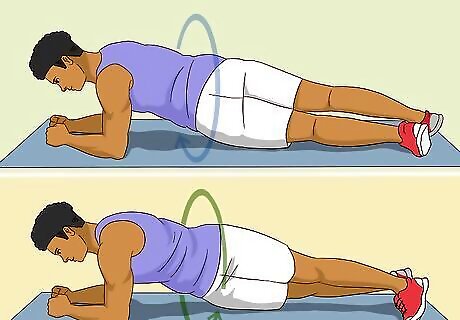
Rotate your hips from side to side to do plank dips. Come into a low plank with your elbows on the ground. Rotate your hips from one side to the other, tapping your hip to the floor. Do 20 reps or as many as you can. Keep your butt low to engage your abs.
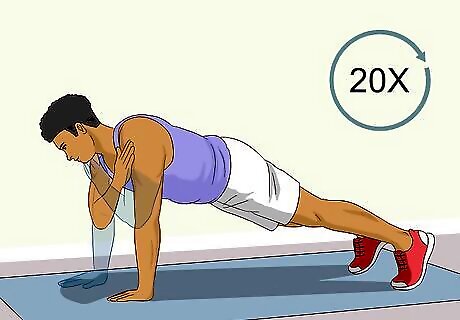
Do shoulder taps to challenge yourself. Start in a high plank and touch one hand to the opposite shoulder and then alternate sides. Try for 20 reps. Alternate quickly to get your heart rate up. This exercise can double as some light cardio.
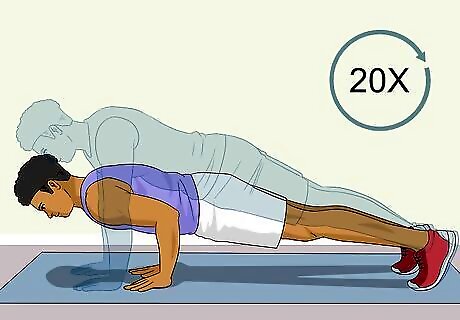
Alternate between the high plank and low plank position to do up-downs. Start in a high plank then lower each arm down into the low plank position. Then lift each arm back into high plank position. Do 20 reps. Aim to move with intention, rather than speed.
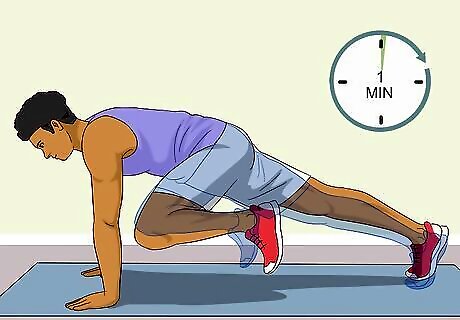
Bring your knee towards your chest to do mountain climbers. Start in a high plank. Bring one knee forward to your chest and then back to its original position. Then repeat on the other side. Quickly alternate between the 2 sides for 1 minute. This exercise can also double as light cardio.
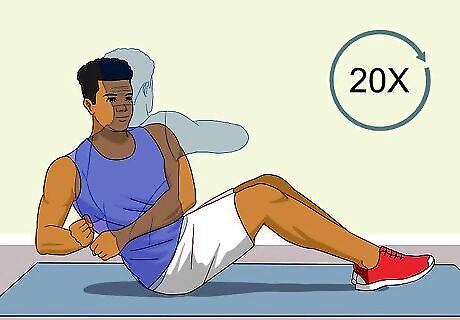
Do Russian twists to strengthen both your abs and obliques. Sit on the ground with your knees bent in front of you. Lean back with your hands in front of you, creating the feeling that your abs have to work hard for you to stay sitting. Twist from the waist until your hands nearly touch the ground next to your right hip. Return to the center and twist to your left. Do 20 reps. To add resistance and build more muscle, try holding a weight while doing this exercise. Strengthen your core safely with smart exercises. "When looking to tone my belly, some trainers pushed extreme diets that didn’t seem healthy. I appreciated this article’s more moderate approach of mixing core moves like planks and bicycles with cardio and strength training. It helps me strengthen my middle safely." - Manoj K. Shed stubborn belly fat through diet adjustments. "As someone trying to slim my waist, I found the diet tips here full of healthy swaps, not restrictions. Small things like switching to whole-grain bread make a difference. Now I know what to eat to chip away at stubborn belly fat." - Rana R. Execute beginner-friendly oblique moves. "The clear instructions for side planks, plank dips, and more made these oblique moves doable for me as a beginner. I can feel my core becoming more toned as I work through the friendly exercises regularly." - Muhammad J. Reach a healthy goal weight through a balanced approach. "My goal is to healthily lose 7 pounds to get back to my ideal weight. This article gave me hope through its focus on nutrition, activity, and self-care. I appreciate its balanced path to get results that last." - Kathy W. Have a story our readers should hear? Share it with 1 billion+ annual wikiHow users. Tell us your story here.
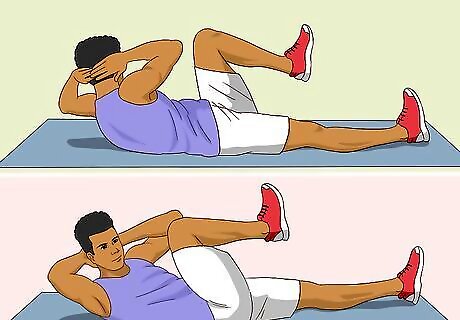
Strengthen the core with bicycle crunches. Lie on your back with your feet held up in a table top position, forming a 90-degree angle. Place your arms behind your head and lift your head and neck off of the ground to engage the abs. Keeping your elbows out wide, lift and twist your right elbow towards your left knee and then repeat the motion on the other side. Do 20 reps.
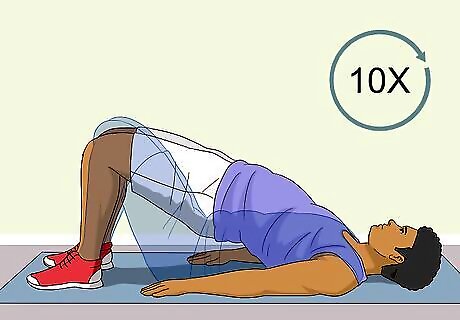
Target your lower back and glutes by doing a bridge. Start on your back with your knees bent and your arms at your sides. Firmly plant your feet into the ground and lift your butt and lower back into the air until you have made a straight line from your knees to your shoulders. Squeeze your abs and glutes for about 30 seconds and then slowly lower yourself to the ground. Do 10 reps. Targeting the back and glutes will strengthen core muscles and can also reduce the appearance of side fat.
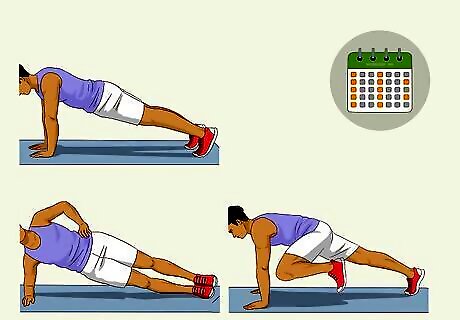
Repeat each of these exercises once to complete a circuit. Doing a series of planks, twists, crunches, and bridges will work your core, including abs and obliques for about 10-15 minutes. Do this 2-3 times a week for strength training. Repeat the circuit again for a full session. Take a break between circuits to hydrate and recover.
Maintaining a Healthy Diet
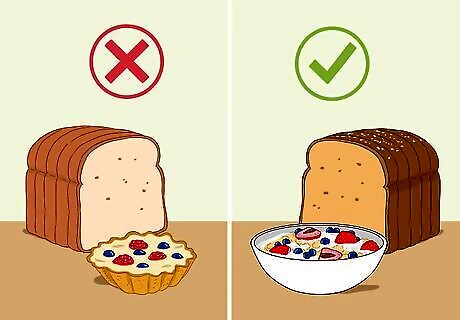
Replace processed flours and sugars with complex carbohydrates. Rather than eating carbs like white bread or sugary snacks like pastries, opt for complex carbs. This includes whole grains like brown rice, chickpeas, oatmeal, and quinoa. You can also look for whole-grain options like bread and pasta. You don’t need to cut out all carbohydrates from your diet, but try to reduce the amount you eat. EXPERT TIP Laura Flinn Laura Flinn NASM Certified Personal Trainer Laura Flinn is a National Academy of Sports Medicine (NASM) Certified Personal Trainer, USA Olympic Weightlifting Sports Performance Coach and Certified Fitness Nutritionist, with an additional qualification as a TRX Suspension Trainer. Laura runs her own personal training program based in the San Francisco Bay Area and specializes in topics such as weight loss, muscle growth, cardiovascular training, and strength training. Laura Flinn Laura Flinn NASM Certified Personal Trainer Our Expert Agrees: You can get rid of fat on the side of your weight by eating healthy, which means limiting your sugar and simple carbs, as well as eating a variety of fresh vegetables and fruits, healthy fats, and lean protein. In addition, core exercises will help tone and strengthen your belly muscles.
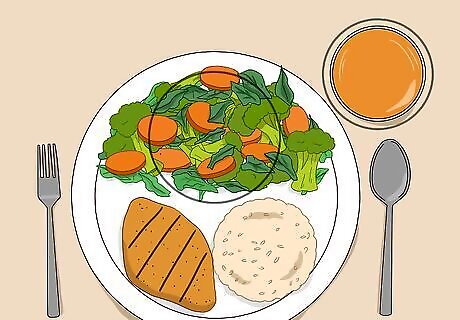
Eat meals that are around 50% fruits and vegetables. In addition to reducing unhealthy foods you eat, aim to increase the healthy foods you eat. Eat 5 servings of vegetables per day, including dark, leafy greens like spinach, kale, and broccoli as well as other raw or cooked vegetables. Eat 4 servings of fruit per day, including whole fruit, dried fruit, or smoothies. If it’s difficult to eat this many fruits and vegetables at first, try to increase how much you eat gradually. Any increase will have a positive effect on your health. Fruit and vegetable juice can add beneficial vitamins and minerals to your diet, but can also add sugar. It’s better to eat the fruit and vegetables instead.
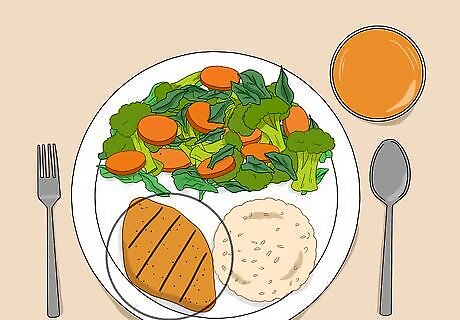
Eat around 50-60 grams of protein every day. Most people, even athletes, eat more than enough protein every day. While it is important to eat protein as part of your exercise and diet routine, you are most likely already eating enough. Try to eat lean protein as much as possible. This includes skinless chicken or turkey, lean cuts of pork and beef, soy, nuts, beans, fish, egg whites, and low-fat dairy. As a rule of thumb, include a piece of meat the size of a deck of cards in 2 out of 3 meals, plus one serving of low-fat dairy at every meal. If you have dietary restrictions, ask a doctor about making sure you get enough protein in your diet.
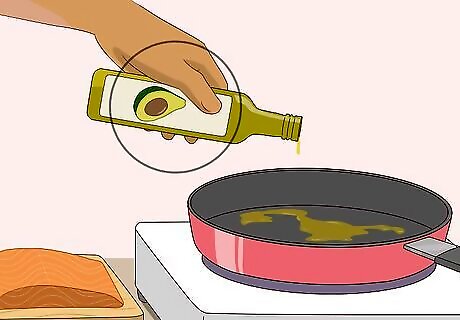
Replace trans and saturated fats with healthier fats. Try adding olive oil, nuts, avocado, and olives into your diet for monounsaturated fatty acids (3 servings per day), and fatty fish like tuna, salmon, and mackerel to get omega-3 fatty acids (2-3 times a week). These are heart-healthy foods and could potentially help blood sugar control for people with type 2 diabetes. Stay away from saturated fats, which are prevalent in red meat and full-fat dairy, as well as trans fats, which are present in processed foods. Eat healthy fats in moderation, and don’t eat more than 12 ounces (340 g) of fish in a week if you are pregnant.
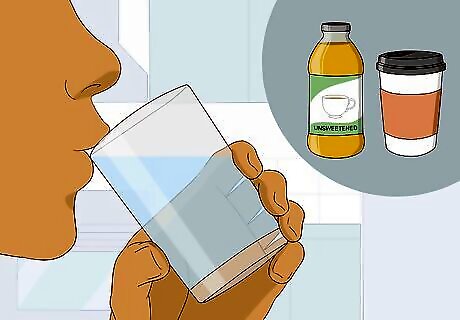
Stay hydrated by drinking about 2 to 3 litres (68 to 101 fl oz) of water per day. Listen to your body and drink when you are thirsty, especially after exercise. You can also drink unsweetened tea or coffee for a caffeine boost without adding extra sugar or calories to your diet. Try not to drink soda or juice. Only drink sports drinks if you have done intense exercise for at least an hour.




















Comments
0 comment